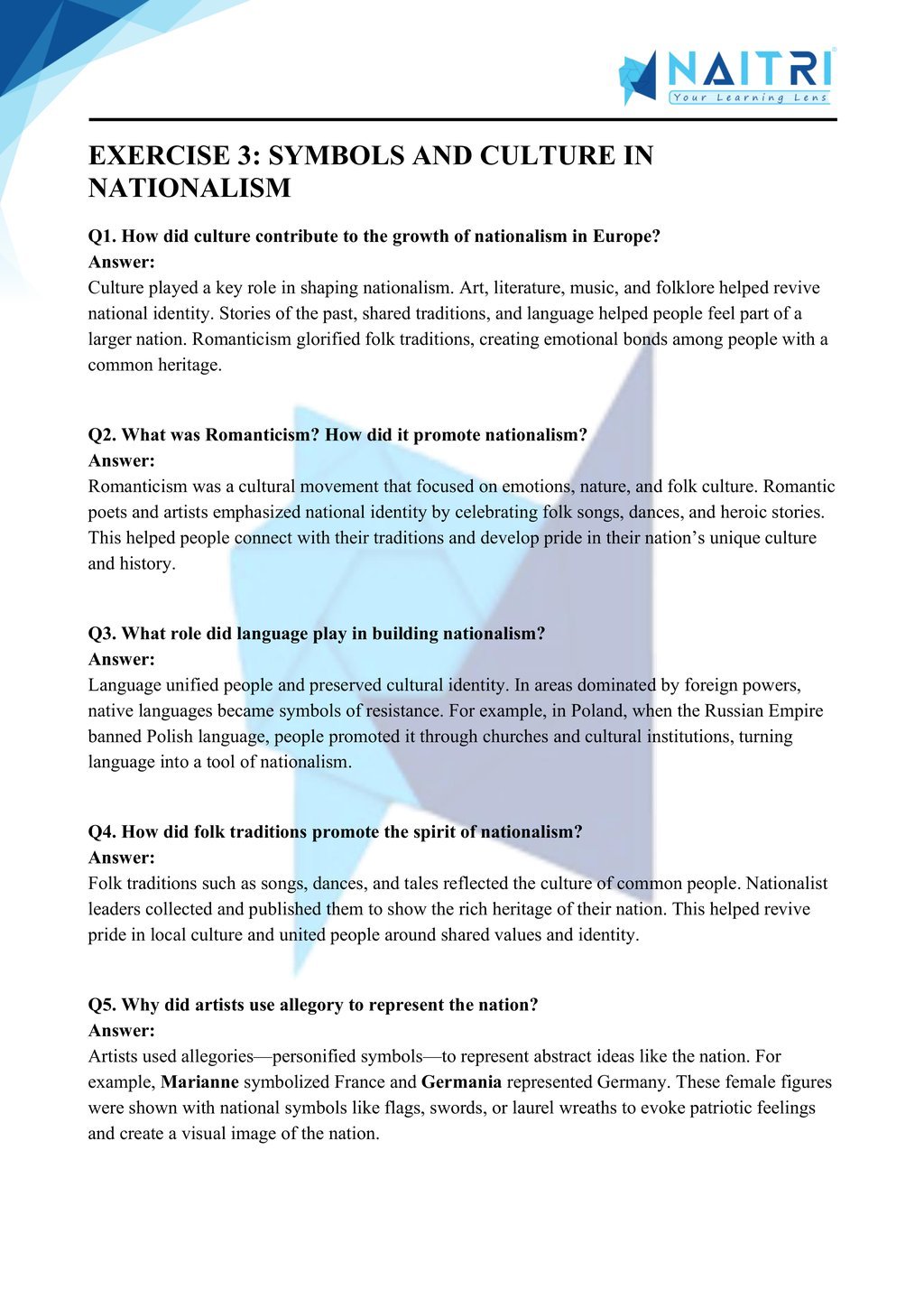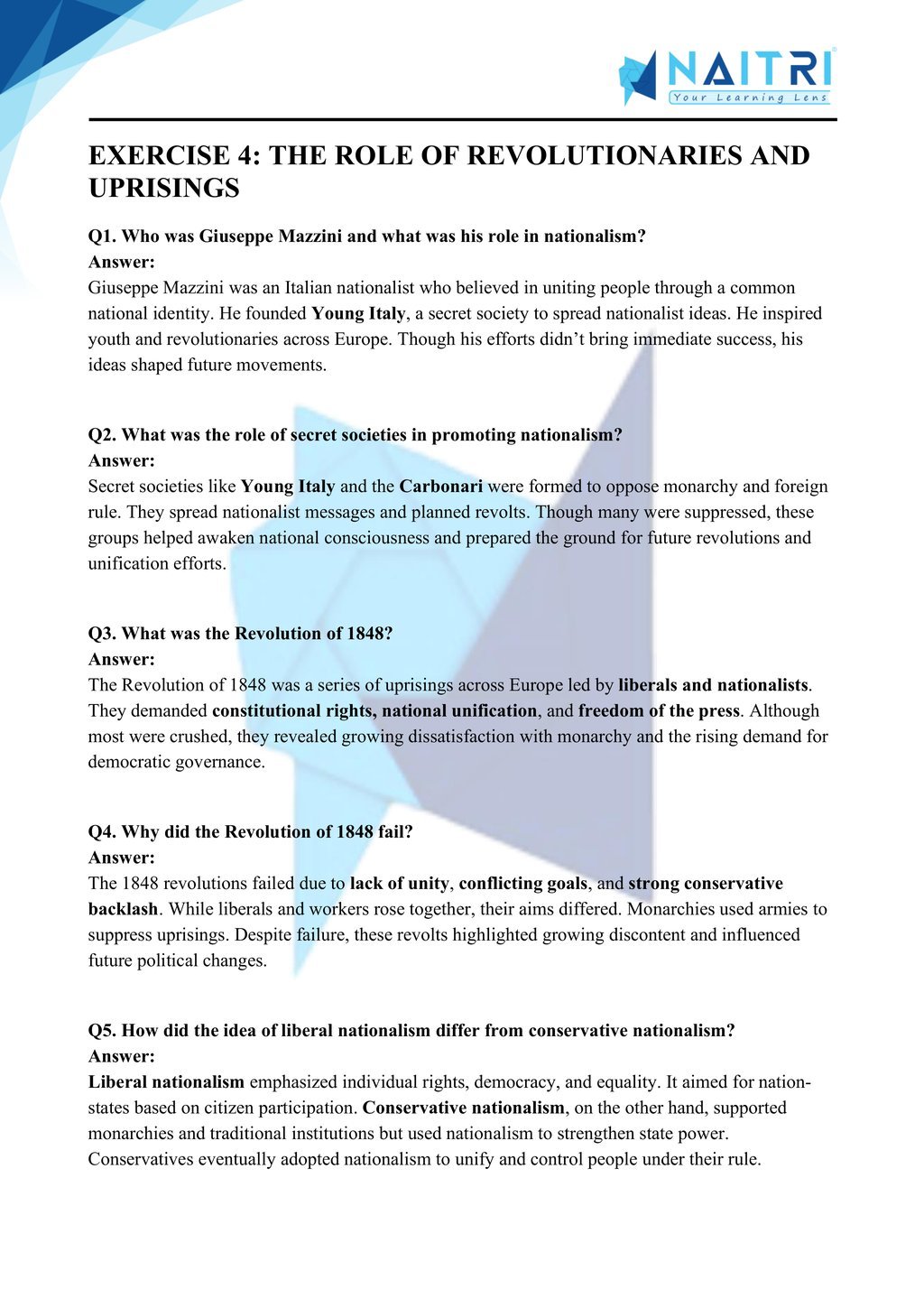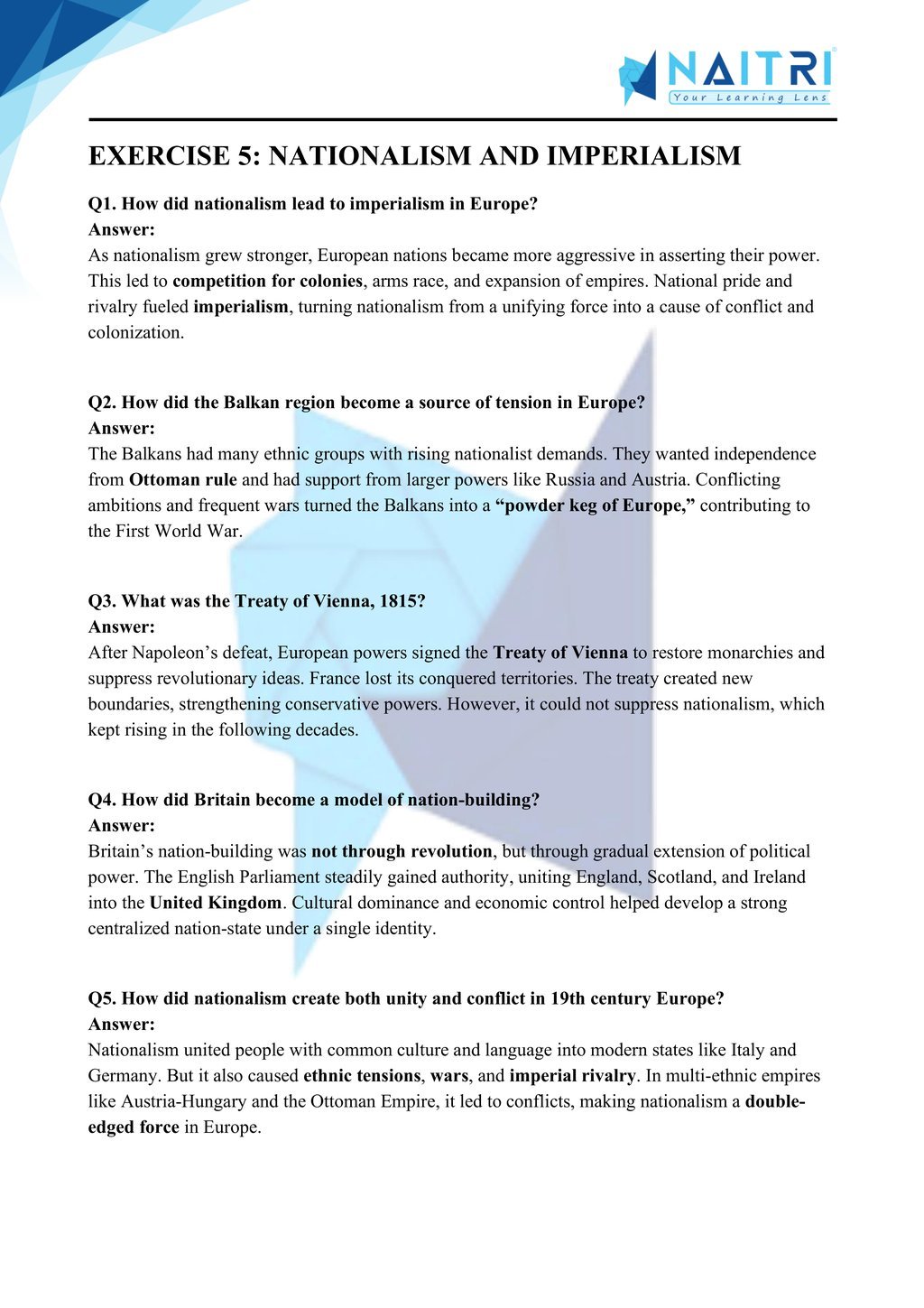MP Board Solutions for Class 10 History Chapter 1 – The Rise of Nationalism in Europe
MP Board Solutions for Class 10 History Chapter 1 – The Rise of Nationalism in Europe are essential for understanding the development of nationalist movements in 19th-century Europe as per the MPBSE curriculum. These well-structured answers help students grasp topics like the French Revolution’s influence, unification of Germany and Italy, and the role of culture and language in shaping national identities. Designed as per the latest syllabus, these solutions strengthen conceptual clarity and improve exam preparation. Ideal for revision and practice, they encourage analytical thinking and historical understanding, making them a valuable study tool for scoring well in Class 10 Social Science exams.
MP Board Solutions For Class 10 History – The Rise of Nationalism in Europe – Exercise Images





Experience History Like Never Before – With AR!
Understanding The Rise of Nationalism in Europe is now more exciting and immersive! With the NAITRI App, you can explore complex history concepts through Augmented Reality (AR). Watch revolutions erupt, nations unify, and symbols of nationalism come to life — right in front of you. Our AR-powered lessons make learning interactive, 3D, and fun, helping you retain concepts better and enjoy every topic.



Visualize . Interact . Understand . The future of learning is here
The Rise of Nationalism in Europe – Important Questions with Answers
What factors contributed to the rise of nationalism in Europe?
Answer: Nationalism emerged due to language and culture awareness, the impact of revolutions like the French Revolution, and growing demand for self-governance.Who was Giuseppe Mazzini and what was his role?
Answer: Giuseppe Mazzini founded Young Italy and inspired Italian unity through advocating popular uprisingsand spreading the idea of an independent nation.What was Young Italy?
Answer: Young Italy, started by Mazzini in 1831, worked to unify the Italian states through national consciousness and a vision of a united Italian republic.What did Otto von Bismarck believe in?
Answer: Bismarck believed in Realpolitik, meaning he supported unification through pragmatic diplomacy, power politics, and strategic wars rather than idealism.What events led to German unification?
Answer: German unification followed three key wars – against Denmark, Austria, and France, culminating in the proclamation of the German Empire in 1871.What was the role of the Zollverein in German unification?
Answer: The Zollverein customs union eliminated internal tariffs, fostering economic integration among German states and paving the way for political unity.How did the French Revolution influence nationalism?
Answer: It spread ideas of citizenship, sovereignty, and national identity, encouraging people across Europe to challenge monarchies and form nation-states.What was the significance of the July Revolution (1830)?
Answer: The July Revolution toppled the French Bourbon monarchy and inspired nationalist uprisings in Belgium, Poland, and Italy.How did education and print culture promote nationalism?
Answer: Schools, newspapers, and books taught national history, language, and heroes, helping create a shared sense of belonging among the populace.What was the significance of the Vienna Congress (1815) for nationalism?
Answer: While the Congress tried to restore monarchies, its conservative actions fueled nationalist movements demanding liberty, unity, and self-rule.Who was Camillo di Cavour?
Answer: Cavour, prime minister of Piedmont-Sardinia, used diplomacy and alliances, especially with France, to advance the cause of Italian unification.What was the role of Giuseppe Garibaldi?
Answer: Garibaldi led volunteers known as the Red Shirts, capturing Sicily and Naples, significantly contributing to the unification of southern Italy.What were the challenges to unification in Italy?
Answer: Regional divisions, occupation by foreign powers, and conflicting strategies among Mazzini, Cavour, and Garibaldi made unification difficult.What was the importance of the Franco-Prussian War (1870–71)?
Answer: Prussia’s victory united German states and led to the proclamation of the German Empire under Kaiser Wilhelm I in 1871.How did nationalism affect the Habsburg Empire?
Answer: Diverse ethnic groups within the Habsburg Empire demanded autonomy, leading to weakening of imperial control and greater national awareness.How did music and sport contribute to nationalism?
Answer: Folk songs, national literature, and organized sports fostered a sense of community, strengthening national identity and unity.What was the idea behind ‘nation’ in the 19th century?
Answer: A concept of people sharing common language, culture, and territory, organized into politically independent and self-governing nations.How did women participate in nationalist movements?
Answer: Women contributed as writers, educators, and activists, mobilizing public support, even though their political roles were often marginalized.How did economic changes support nationalism?
Answer: Industrial growth and railways connected regions, stimulated economic unity, and helped create national markets that supported unification.What were the disadvantages of nationalism?
Answer: Nationalism often led to exclusion, racial superiority, and conflicts as nations prioritized identity, sometimes resulting in wars and intolerance.What is a nation-state?
Answer: A political unit where a single nation forms a sovereign state, based on shared identity, language, and collective self-rule.What is the importance of national flags and symbols?
Answer: Flags and emblems provided unity in public ceremonies and helped visually represent emerging national identities.How did peasants join nationalist struggles?
Answer: Peasants engaged through religious and local associations, influenced by patriotic ideas circulated in print and festivals.What role did intellectuals and artists play?
Answer: They wrote literature, poetry, and songs celebrating national history and identity, helping spread nationalist sentiment through print and public forums.Why is studying nationalism in Europe important?
Answer: European nationalism reshaped political boundaries, popular governance, and sparked both liberation and conflict—foundational for understanding modern geopolitics.
The Rise of Nationalism in Europe explores how the idea of nationalism developed in 19th-century Europe. It begins with the French Revolution and examines the role of liberalism, conservatism, and revolutionary movements in shaping modern nation-states. The unification of Italy and Germany is discussed in detail, along with the role of cultural identity and symbols. This chapter helps students understand how political and social movements fueled the growth of nationhood in Europe.
Download Naitri App
Easy, Visual Learning — Right on Your Phone
Learn with Augmented Reality! The Naitri app makes CBSE and MP Board concepts interactive and fun — even in low-resource settings. Watch lessons, complete homework, take tests, and track progress — all in one place. Anytime. Anywhere.
Available on








